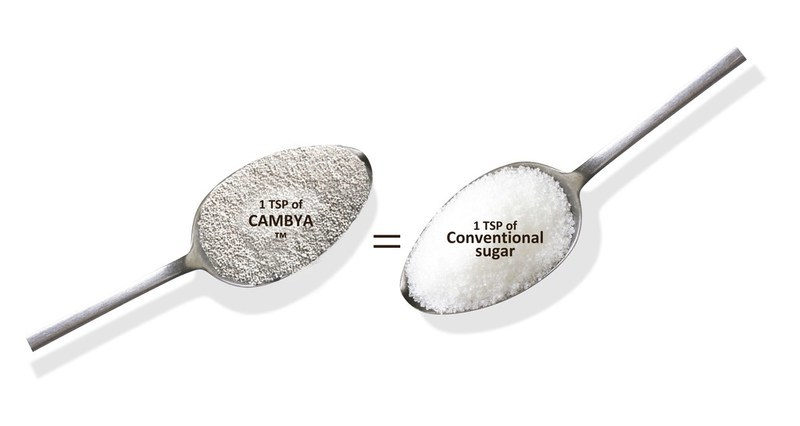B.T. Sweet, an Israeli food tech startup, recently unveiled a plant-based, one-to-one drop-in sugar substitute called Cambya. It can replace sugar in a multitude of applications in the chocolate and confectionary space, boasting the same levels of sweetness and body as real sugar. So, what is Cambya and what differentiates it from other sugar substitutes?
What is Cambya?
The proprietary formula is a sugar reduction compound based on soluble fibers, monk fruit and select botanicals. Patented by the World Intellectual Property Organization (WIPO), Cambya can be used in dry, wet, hot, cold and frozen food and beverage applications and offers a rich source of naturally-derived fibers. It delivers sweetening capacity without the need for masking agents, nor does it leave any lingering aftertastes, a common characteristic of sugar substitutes.
“Cambya applies a unique process to overcome these organoleptic challenges by targeting the hydrophobic sites on natural sweeteners, rendering them less accessible to flavor receptors,” said Gil de-Picciotto, co-inventor of B.T. Sweet, in a press release. “This, in turn, delivers sugar-like sweetening and bulking effect.”
The sugar substitute is a result of three years of R&D — mixing and matching a broad range of fibers, botanicals and natural sweeteners. To ensure high solubility and blending capacity for easy integration into food and beverage products, B.T. Sweet also explored different development techniques with minimal processing.
While it embodies all the properties of table sugar, Cambya contains no added sucrose or artificial additives. The company’s goal is to bridge the gap between consumers’ desire for indulgence and the drive to curb sugar intake, a growing problem across the globe. With sugar being cheaper and more widely available than ever, B.T. Sweet aims to help brands remove undesirable “high sugar” warning labels currently mandated in several countries.
Related: Are Low-Calorie Sweeteners Healthier than Sugar?
Growing Sugar Substitute Market
According to MarketsandMarkets, the global sugar substitute market was worth an estimated $16.5 billion in 2020 and is projected to reach $20.6 billion by 2025, with a compound annual growth rate (CAGR) of 4.5 percent. The growth of the market can be attributed to an increase in health consciousness among consumers and an increased demand for better-for-you alternatives.
Food and beverage manufacturers are actively seeking feasible means of reformulating their products with reduced levels of sugar due to new legislations and tax levies being placed on sugar. A report from the US Department of Agriculture (USDA) noted a stagnation in sugar consumption in 2020 along with a concurrent increase in sugar substitutes, especially in the natural and plant-based sectors.
With the market expected to grow, Cambya will compete with several other players in the sugar substitute space, including Tate & Lyle, Cargill Incorporated, Ingredion Incorporated and The Nutra Sweet Company, among others.
For the time being, Cambya will be produced in Europe and will run on plug-and-play business models, helping food and beverage brands reformulate their consumer packaged goods (CPG) products. B.T. Sweet gives manufacturers the flexibility to completely switch their sweetening system or balance it with standard sugar or sweeteners.
“We have a working proof-of-concept that confirms applicability in dry, wet-hot, and cold applications,” said Yoav Gaon, CEO and business development manager of B.T. Sweet, in the same press release. “This significantly shortens lab-and-line food trial time and costs. Cambya offers a ‘one-fits-all’ solution, just like sugar.”












Join or login to leave a comment
JOIN LOGIN